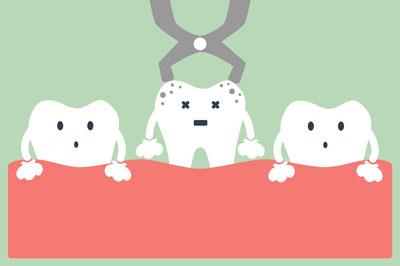
Tooth extractions are sometimes necessary and a tooth sustains damage that hinders the functionality of the tooth. While it is true that adult teeth are designed to be permanent, there are a number of conditions that can lead to the need for tooth extractions. These include:
- Severe damage
- An intense infection
- Overcrowding
- Disease
- Not enough room for wisdom teeth
Reasons that may cause the need for a dental tooth extraction
Patients often wonder what can cause the need for a dental tooth extraction. There are numerous answers to this question. As mentioned earlier, the most common reason for having to remove a tooth by extraction is damage. The next most common reason why people have to have their teeth removed stems from infection.
Tooth extractions are sometimes necessary when a root canal therapy fails to stop an infection or if the infection is exceedingly severe. Sometimes, an infection can penetrate the tooth, getting into the root and pulp of the tooth. The pulp is the inner, soft portion of the tooth. In order to clear up this kind of an infection, the dentist will prescribe antibiotics and then perform a root canal. The root canal typically removes the infection by removing the root and the pulp. In some cases, the infection is so severe that the root canal treatment is not effective and tooth extractions become necessary. Removing the tooth is a sure way to stop the infection and more importantly, stop the infection from spreading to other teeth.
Tooth Extractions Can Prevent Infections from Moving to Other Areas
Preventing an infection from spreading is another reason why we may have to do tooth extractions. If you have a compromised immune system, we want to make sure you are not at risk for a severe spread of any infection. Patients who are undergoing chemotherapy, for example, have a severely compromised immune system, which makes it critical that they do not have an infection. When a tooth is showing signs of becoming infected under these circumstances, Robert S. Sykes, DDS will recommend extractions so as to prevent the infection from occurring.
Extractions commonly treat overcrowding in the mouth. With advanced orthodontics, we are often able to maneuver the teeth in a way that reduces the need for extractions. However, there are times when the mouth is just too crowded and tooth extractions are the only way to make sufficient space. If a tooth cannot come through the gums, also known as erupting, because there is not enough room for it, we may consider tooth extraction as a way to relieve the pressure. Similarly, if your teeth are too big and there is simply not enough room for all the teeth, we may recommend extractions so the teeth that are left are properly aligned.
Related Posts
Complications To Watch for After a Tooth Extraction
Complications after a tooth extraction are uncommon, but understanding the warning signs helps protect long-term oral health. During healing, problems such as infection, dry socket, or prolonged bleeding can occasionally develop. Knowing …
Healing Time Length After a Tooth Extraction
An extraction is usually recommended as a last resort when a tooth is too damaged to be saved. The two main types of extractions performed by dentists are simple and surgical extractions. …
How Long Does it Take to Recover from a Tooth Extraction?
If you are in need of a tooth extraction, you may be wondering how long it will take to heal from this procedure. Let's discuss the various reasons for having a tooth …
How an Emergency Dentist Fixes a Broken Tooth
A broken tooth can happen at any time — during sports, while eating, or from an unexpected fall. Regardless of the cause, an emergency dentist can help. Through prompt treatment, these dental …





